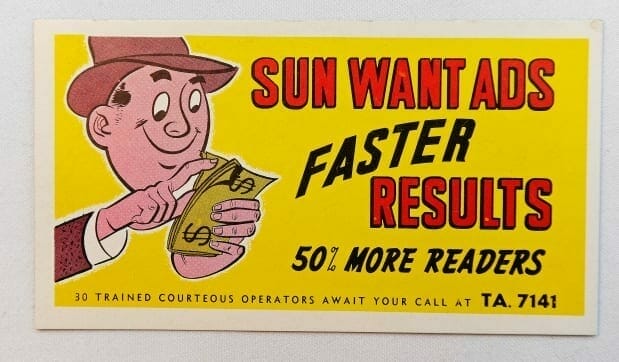So a handful of years ago, Postmedia paid me to go away and do something else instead of writing stories and creating online business opportunities for the Vancouver Sun and Province newspapers.
That was fine by me. I’d put forth 29 online projects in six months and had all but one rejected, and the one that wasn’t rejected was deconstructed by sales people and marketing people to the point where I wanted nothing to do with it. Another, that I and two colleagues undertook in our own time, because it had been rejected as a concept by editors, won a Webster Award for excellence in BC Journalism.
But it was first sat on for three months to allow ads to be sold into it, which nobody in the ad sales department bothered to do, only to be blasted out on short notice when a participant died suddenly.
Yet another project, done mainly because I had literally nothing else to do with my time what with all the “No, that’s too hard,” notes from above, involved building an online home for the old Edith Adams homemaker archives, after finding an eight-foot stack of scrapbooks from as far back as the 1920’s in the library (as it was being closed down and sent to a storage bin to save costs).
It debuted to great reader response, and was subsequently deleted from existence as soon as I was out the door.
I love journalism, but it needs to adapt to survive, and it needs to get back to being a service to readers, rather than something to hang soap ads on, and it wasn’t being that.
So I made a last ditch effort to provide a fix. Postmedia boss Paul Godfrey had sent out a company-wide note asking for ideas, observations, ways that we could do better, and for information about what was broken. He said he’d keep it all confidential. He provided an email address for anyone who felt like they might like to step forward with a plan.
I bit. I may have been the only one. He seemed surprised to receive a note, let alone one that ran 25 pages or so, but he called me and thanked me and said this was important and he wanted more info and he would “absolutely act on it.”
So I gave him more. Places the company was bleeding out. Policies that served to prevent people selling ads. HQ habits that stomped on innovation. Successes and failures.
The best example of this was when the Japanese tsunami hit, with us the only newsroom seemingly awake in the world at the time for the biggest story of that year. Five of us had worked, mostly from home, through the night (unscheduled and unpaid) compiling stories and video and photos and information that even CNN mentioned online was, ‘the best place to get information about the situation right now.’
A standard overnight would see 100k page views across all Postmedia properties. That night we did 12 million page views just at The Sun before 6am, and tens of millions more the next day.
We got in trouble for that because, and I quote, “We don’t sell ads to Tokyo,” and “Do you know what it costs to serve all that bandwidth?”
So I reveled in the creation of the Godfrey document, figuring that if only one page of it was acted on, the company had a chance to maybe turn things around. Or at least survive longer.
Instead, Godfrey had coffee with the publisher and said, “Deal with this,” reportedly sliding the document across the table before talking about the Blue Jays.
The publisher subsequently called me into his office and spent 20 minutes telling me everything was great already, that I didn’t get how things worked but it would be fine. He thanked me for my time and sent me back downstairs to my office where no idea, project, proposal, or story I ever had anything to do with would see the light of day from that moment forward.
When I complained about this, a lesser manager told me, “Take your very generous salary, fuck around on Facebook, and shut the fuck up.”
Two-time Webster Award winner. Writer of eight of the ten most highly-visited online stories in Postmedia’s previous five years. Took monthly site traffic from 7m to 55m in four years.
“Shut the fuck up.”
Meanwhile, the wise people at the top approved this, right before a Liberal Party landslide election win:
My last act at Postmedia was to propose they launch a site like this one.
“There are 25 companies within three blocks of us that made a billion or more in revenue last year. We should write about them. They would like this and ads would be sold,” I said.
“Our ad sales people don’t know how to talk to those companies. There’s no point,” was the reply, followed by an, “Our readers don’t care about that stuff anyway.”
In its first year, wit basically just me writing in a cafe on an old laptop, Equity.Guru made more profit than Postmedia.
Admittedly, that wasn’t hard. But I take great pride in having done it from scratch, with a pitch they couldn’t comprehend, in a way that I’d scratched onto paper four years prior and that still works.
The key to making journalism pay for itself comes in three parts:
1: Demonstrate you’re on the reader’s side.
2: Speak truth to power.
3: Be better than everyone else in one single area.
We chose smallcap investment opportunities. And though nobody has called us the biggest in this business, the people who have been bigger, who trade in positivity for any company that pays them their fee, seem to rise and fall like clockwork every single year.
We plan on being around in twenty, and if we’re only a solid #3 for each of those years, but our readers make money off that, it’ll be a great business model and a life well lived.
Journalism is far from dead. But the people who run the journalism empires that used to shit money every morning and required precious little effort in return because they had a monopoly on reach? Those people have no idea how to do what they do.
They don’t understand that their reputation is their most prized asset, that their readership must be renewed every year with young people who have many other options. They talk endlessly about what their subscribers want, without realizing a percentage of those subscribers died in the last year. They put ridiculousness like ‘speaking thumbs’ on billboards instead of the reporters who risk their lives to tell a story. They stomp on any effort to speak truth to power. They think in 400 word slices and in six word headlines. They understand nothing about design or marketing or demographic analysis or what readers want or – more importantly – what it’ll take to make new readers.

I watched David Baines up close at The Sun as he wielded his righteous indignation at Howe Street every week, brutalizing folks who had it coming and who were taking seniors – which make up most of The Sun’s readership – for a financial ride down the toilet. Then I watched as they stuck his work on pages you had to work harder and harder to find. And answered queries from management as to why I was putting his stories online, where they might be seen… and where they might be sued.
That’s where this website came from. I cite Baines often, much to his discomfort, because his journalism served this city to the benefit of all. Even stock promoters of the sleaziest kind, the ones who laughingly compare how many times “Baines got me” with others of their ilk at the Butcher and Bullock, realized his necessity. When he nabbed them, the majority responded with a ‘gulp’ and a ‘fair enough.’
Companies rose and fell. Bad folks went to jail. Reputations were made, and killed. That’s what made it important reading, even if it scared the shit out of the people who owned the paper, to the point where they tried to bury it.
Equity.Guru is admittedly guided by a desire to find the middle ground between Baines and the bad guys, realizing that every company needs to market itself to investors, but that said marketing needs to be straight or everybody eventually loses.
We’ve taken hundreds of millions of dollars off the market caps of unscrupulous companies in the Canadian junior space by revealing our due diligence. Some of those have been our own clients.
But part of that process is rehabilitation, as opposed to annihilation. If a company gets shitcanned by us, we expect them to either disappear into the ether, or do better and come back stronger.
When Laguna Blends (now Isodiol), one of our first clients, didn’t do what they’d promised investors they were going to do, we called them out, in no uncertain terms. When the CEO called me, furious, we wrote about the call. For six months, we kicked them around and offered no refunds.
Then they started to fix their deal. When the news began to emerge that they had something real, we spoke warmly of it, and the stock shot upwards. It is now a beast.
That same CEO would later tell me, “I get it now. Legitimacy spikes harder than anything.”
Journalism isn’t broken, but its legitimacy is. As The New York Times allows it reporters to act as stenographers for a President who may have early onset dementia, refusing to ask follow up questions lest they be asked to leave the room, journalism needs people who will ask tough questions, or throw themselves in front of a bullet, and media outlet owners who understand that short term losses over being a pest to powerful people are almost always offset by the people gathering behind you.
This past year, our web traffic is up 400%. Our writing staff, who are paid enough to live in Vancouver (an increasingly rare thing), has grown to five and our unpaid intern number is zero.
Our client base is up 110%, our client retention rate is at 42%, our email engagement rate is 41%, social media numbers are up, so are the numbers of potential clients we reject based on our due diligence.
But the thing that makes me happiest is, while Postmedia bleeds out and shuts down newspapers and retires its star writers, we’ve done a deal with the company to buy space in the business section of two of its newspapers, for our journalism to go in front of the readers we know will benefit from it. The circle of life has a sense of humour.
I took a few chances in building this thing we now enjoy bringing to you. We don’t hang ads off the site or hit you with pop-ups or sell your info to marketers. We don’t endlessly pump out positive content for whoever signs a cheque for us. We hold positions in some of the companies we write about, so if you lose money on it, we do too, and we always disclose that fact.
Mostly, what makes me happiest about this whole thing is the people who tell us they’ve made money reading our site – or not lost money because they saw something here and realized they should sell.
Journalism is a service. Your bottom line matters to us more than ours.
And that’s how Equity.Guru has grown to this point, and why Equity.Guru is going to light shit up in 2018.
I can’t tell you what’s coming down the pipe beyond January, but there’s a lot. In that month, you’ll find me speaking at the Vancouver Cambridge House investor show once again. My keynote last year was called, “Five of you people are going to be dead by this time next year, so we better get some new investors in the room.”
This year I plan to name them.
Just kidding. But I will be speaking on the topic of ‘Mining, Weed, Blockchain or…?’ and I will be at the Equity.Guru booth
Register early. It’s always a hot ticket.
The Twitch livestreams will return shortly, as will the podcasts. Braden Maccke is working on a weed-focused data project that we think will be a big deal. Steph Herman will continue bringing the French language news from Quebec, which has already revealed some nice opportunities. Craig Amos will continue to mine the Australian Stock Exchange for opportunities, Lukas Kane will keep making you laugh, and I’ll keep swearing too much.
We will add to that lineup this year, guaranteed. This thing is growing faster than I could have imagined. The biggest challenge for us will be to keep it from getting out of our control.
To potential future clients: Bring your A-game.
To potential future readers: Welcome.
To potential future writers: Treat what you do like a business every day or keep walking.
To people wondering what they just read: It’s intraspective wankery, but I only do that once a year and now that I’ve used up my Paul Godfrey tale, it’ll be different next time.
To open 2018 i’m bringing you a story that I’m sure many will come check out. Remember last year, when I took a 30,000 foot dump on Imagination Park (IP.C)?
I’ll be talking to the CEO next week. He says it’s a whole new deal there and wants to show me. I’m ready to give a fair hearing but remain cunical. It should be an interesting follow-up.
Love,
Chris Parry, founder of this stuff here.
[TL;DR: It’s been a good 2017. The next year will be boss.]




Love your work Chris, fascinating story.
Been reading for about 18 months I think, including the good old twitch streams!
You guys have a great approach and I always welcome all the articles that are posted here.
Looking forward see what you have coming in 2018…..
Ditto! I was pointed your direction via a colleague recently, and I can honestly say your articles are the most well written, informative, and plain interesting to read I have yet to come across. Your work and diligence are certainly appreciated!!! 🙂
Thanks Chris and the EG team!
Chris,
Your site is awesome. I have recommended equityguru to many of my friends and newby investors alike.
You and your cohorts are a breath of fresh air in the truthiness department 😉
Cheers Bro!
Appreciate the stout insight and fresh approach. Exciting times ahead. Looking forward to the weirdness
I cannot find the follow-up on Imagination Park, is it somewhere?